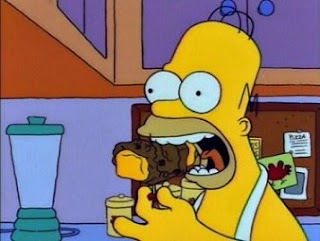Attack of the Snack!

“People don’t get fat from overeating.” This bold statement by Robert Cywes, MD, PhD snaps me out of the lull of my morning commute. “People get fat,” he goes on to say, “because they are addicted to a drug called carbohydrates.” In the course of three episodes of the Diet & Health Today podcast , author and researcher Zoë Harcombe, Ph.D., interviews Cywes on his great success in getting patients thin and healthy. Cywes is a bariatric surgeon, so for his patients, losing weight is the easy part. Bariatric surgery has a very high success rate in the short term. The problem is, the long-term results are not so hot . Many people regain the weight after a few years, as they slip right back into old habits. Cywes’s solution: follow up the surgery with ongoing support in what he calls “AA for fat people.” (As a former obese person himself, he feels comfortable using the very un-PC term “fat person.”) Cywes explains that food gives us two things: nutrition (that


